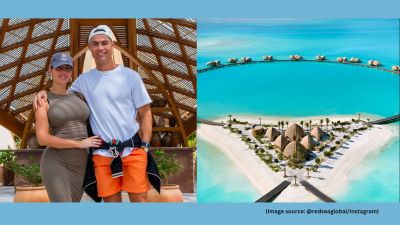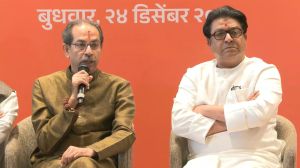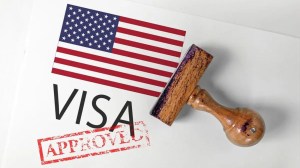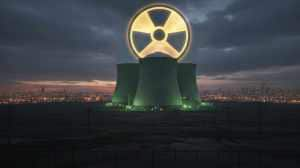Explained: Gotabaya Rajapaksa has fled Sri Lanka, but he still remains its President. Here is how the Constitution’s Article 37.1 works
Under Article 40, Ranil Wickremesinghe would have been President only until July 20, when Parliament would elect the new person in the post. But now he is acting President indefinitely, as Article 37.1 does not prescribe any time limit.
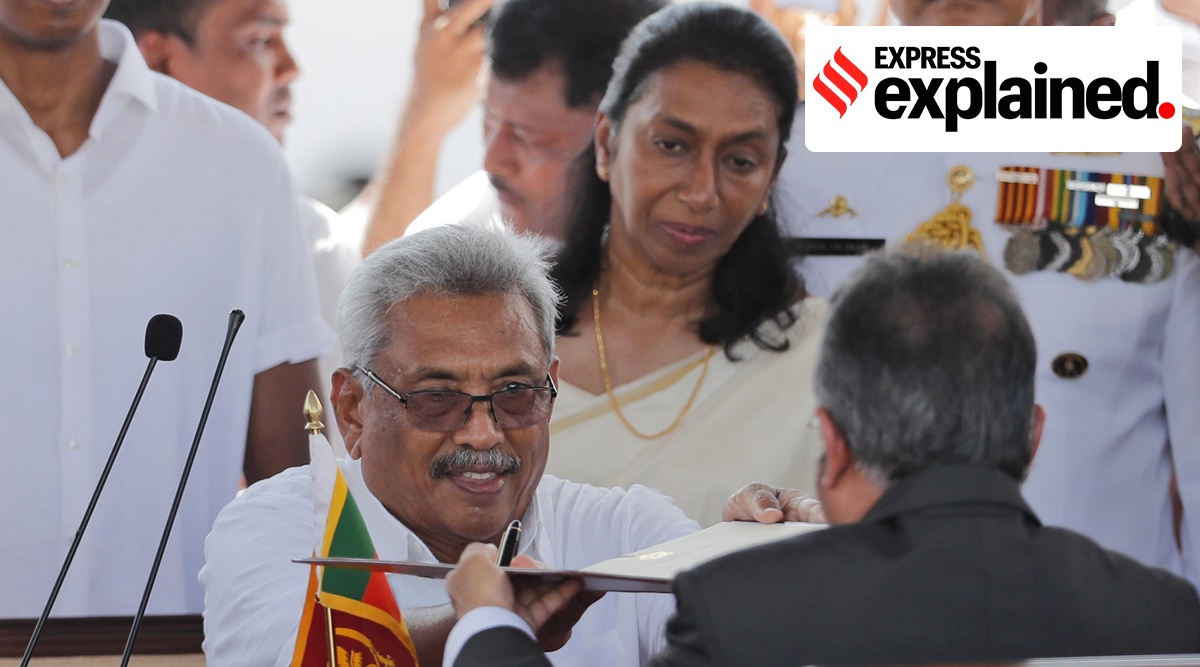 Then Sri Lanka's newly elected president Gotabaya Rajapaksa, center, hands over oath taking documents to Chief Justice Jayantha Jayasuriya as his wife Ayoma watches during his swearing in ceremony held at the 140 B.C Ruwanweli Seya Buddhist temple in ancient kingdom of Anuradhapura in northcentral Sri Lanka Monday, Nov. 18, 2019.(PTI)
Then Sri Lanka's newly elected president Gotabaya Rajapaksa, center, hands over oath taking documents to Chief Justice Jayantha Jayasuriya as his wife Ayoma watches during his swearing in ceremony held at the 140 B.C Ruwanweli Seya Buddhist temple in ancient kingdom of Anuradhapura in northcentral Sri Lanka Monday, Nov. 18, 2019.(PTI)Sri Lanka’s Speaker Mahinda Yapa Abeywardena has announced that President Gotabaya Rajapaksa has conferred powers on Prime Minister Ranil Wickremsinghe to function as the Acting President under Article 37.1 of the Constitution.
This means that President Rajapaksa, who fled to the Maldives in a Sri Lankan Air Force plane in the early hours of Wednesday (July 13) after previous unsuccessful attempts to leave the country, has not yet resigned.
Even so, Speaker Abeywardena continued to say on Wednesday that Gotabaya would indeed resign, as planned.
What is Article 37.1 of the Sri Lankan Constitution?
Under this provision, if the President is of the opinion that “by reason of illness, absence from Sri Lanka or any other cause” he is not able to discharge his duties or exercise his powers, he may appoint the Prime Minister to act in his office during such period. He may also appoint a Cabinet Minister to act as Prime Minister in this period.
Does this mean Gotabaya Rajapaksa remains President?
Yes, because Article 37.1 still assumes that there is a President still in office.
Had Gotabaya resigned, Article 40 would have been the relevant provision. Under this Article, should the office of the President fall vacant before the expiry of the five year term, the Parliament has to elect one of its members as President. The successor will hold the office for the remainder of the term of the vacating president.
This election has to be held within one month of the vacancy arising. The election is by secret ballot, and the candidate has to win an absolute majority. On Tuesday, expecting that the President would resign on July 13 as he had said, the Speaker had announced the date of the election as July 20.
But would not Wickremsinghe have been President in any case?
Under Article 40, between the vacancy arising and the assumption of office by the new President elected by Parliament, the Prime Minister functions as the acting President. And he will appoint one of the Ministers of his Cabinet to act as Prime Minister.
As the Prime Minister in office, Wickremesinghe would have become the interim President under Article 40 — but he would have been President only until the election. Now he is acting President indefinitely, as Article 37.1 does not prescribe any time limit.
But why has Gotabaya not resigned yet?
One reason is that he wants to remain in office in order to retain his immunity until he is sure that he will not be forced to return to Sri Lanka. Additionally, according to some reports, he is negotiating for safe passage for his family members.
- 01
- 02
- 03
- 04
- 05


